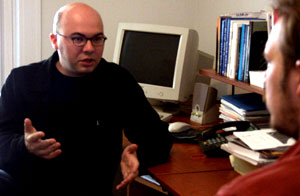Maybe the Muslims Will Help

Keywords: Siddiq Weera; Alexa McDonough; O'Connor; Jack Layton; NDP; Steven Staples; Najibullah Lafraie; Karzai; Afghanistan; Muslim; peacekeeper; war-fighting; troops out now.
For the past couple of days I’ve been exchanging e-mails about Afghanistan with people whose ideas are similar but not identical. Peace Magazine is going to publish Joanna Santa Barbara’s piece about the “third option” for that country — neither the “troops out now” option nor the “give ‘em hell” war-fighting option. Her notion, which was enunciated by her friend Dr. Siddiq Weera, is that the Canadian mission should revert to its original one — peacekeeping — while the main effort should be to carry on a dialogue among all the parties (including warlords and Taliban) who had been excluded from power by the US victory and the creation of the present constitutional government headed by Karzai. The only lasting solution has to be a negotiated one.
While recognizing that truth, the position of most peaceniks in Canada is not favorable to the “third option” because it would leave Canadian soldiers there, in some role or other. Opinion now is swinging against any involvement of our military at all, especially since there are Canadian soldiers being killed several times a week in the region where they are based. The minister of defence, O’Connor, has stated yesterday that Canadians have too difficult a responsibility now in Afghanistan and need additional assistance from other countries. If he is saying that, you can be sure that other politicians are privately saying something even more dramatic. Most Canadians probably already regret having committed the troops to this prolonged war-fighting role. Jack Layton and the other NDP leaders are calling now for the withdrawal of troops, coupled with a conflict-resolution project that would reach out to all parties who have grievances.
I understand that Alexa McDonough went to Afghanistan herself and came back believing that it was not right to withdraw Canadian troops and leave people to their own fate there after having supported them in their monopoly of power and their exclusion of the Taliban and other opponents from power This would lead to a terrible intensification of the conflict and the loss of many lives. Yet, after she returned to Canada and talked to military leaders, they persuaded her that it would be impossible to change the rules of engagement for the Canadian troops while they are there in the field. They would have to be brought home and sent back with new instructions. So she has backpedaled from the position she took at the World Peace Forum in Vancouver, for now she takes the same position as Layton, at least in public.
Apparently Steve Staples (see photo) has adopted the NDP “troops out now” position. He sent out a message yesterday from the “ceasefire.ca” e-mail address, announcing his intention to launch a peace movement campaign to return the Canadian troops home. I sent him an email proposing instead the shift to peacekeeping that he and Alexa apparently believe cannot be done, and he wrote me again to say so.
But today there was another paper being circulated that I think is helpful. It is by Najibulla Lafraie, a lecturer in political studies at the University of Otago, New Zealand, who had been Afghanistan's foreign minister from 1992 to 1996. (I’m a little confused about his identity, for there had been another Afghan honcho earlier also named Najibullah, but I think he’s a different guy. He was the one who negotiated the withdrawal of Soviet troops during Gorbachev’s period, I believe.)
Anyhow, Professor Lafraie, as I will call him here, now claims that the American and NATO forces are “no longer part of a solution in Afghanistan, but part of the problem.” Despite having liberated the people from the Taliban, by now they are regarded as infidels who have “overstayed their welcome.” Lest their presence continue to offer the Taliban a recruiting tool, they must be withdrawn as soon as possible. Lafraie writes,
“This suggestion may seem irresponsible. Without the military support of the international community, the Karzai government would not be expected to survive more than a few months. But that would not be the case if the withdrawal of the American and NATO troops took place as part of a well-planned, comprehensive solution of the Afghanistan problem.”
Essentially Lafraie accepts the NDP/Steve Staples argument, but with a different wrinkle: that a new Muslim peacekeeping force should be formed under the direct command and control of the UN to replace ISAF and allied forces.
Lafraie also suggests other less original proposals, such as a stronger training of Afghan army and police; a new intra-Afghan dialogue; a fresh focus on human development; and the curtailing of interference by neighbors – notably Pakistan.
This proposal strikes me as remarkably promising. There are Muslims in the new troops that will monitor the ceasefire between Lebanon and Israel. Muslims from such stable countries as Malaysia and Tunisia might be quite acceptable in Afghanistan. There are other Muslim countries as well that are very different from the Wahabist gang whose radical Islamic attitudes have caused so much grief; Indonesia comes to mind as an example, but they have their own problems at home that may make them less acceptable in the Muslim world. Still, this proposal has many advantages and I am inclined to support it right away.



0 Comments:
Post a Comment
<< Home